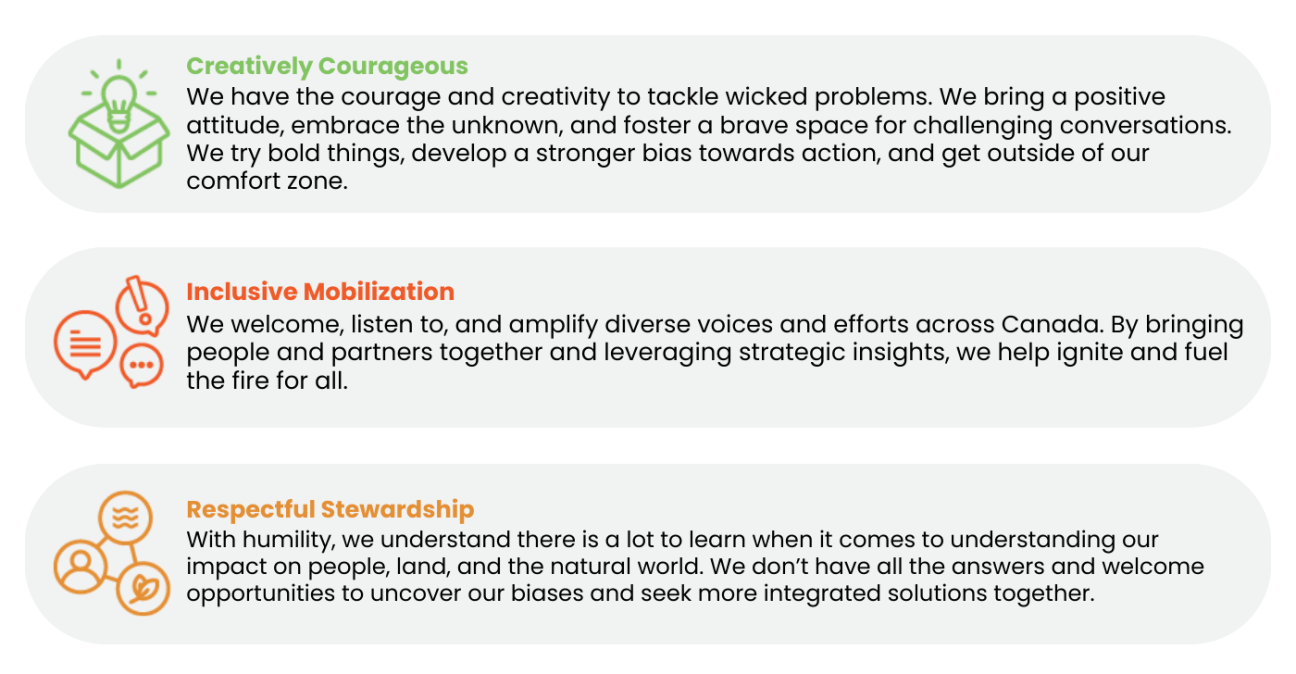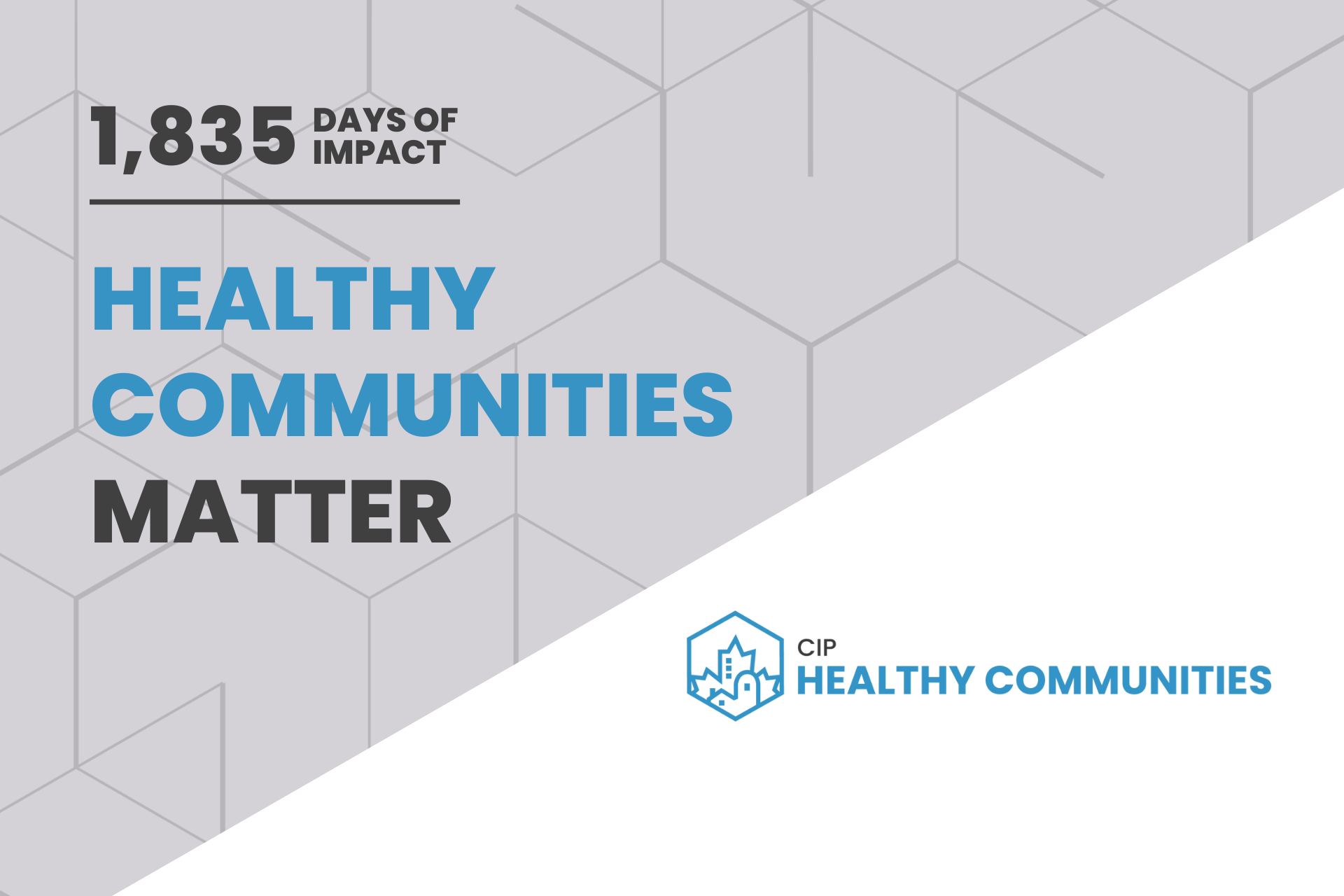Healthy Communities Matter to Planners.
Canadians are more worried than ever before about protecting both their physical and mental health. A growing body of research suggests that planning policies and their influence on the built environment directly impact citizens’ overall well-being, making planners a critical part of the design and implementation of healthy communities.
At CIP, our commitment to promote and protect healthy communities is embedded in our Strategic Plan—1,835 Days of Impact—with our guiding vision being that of “inclusive and vibrant communities, respectfully connected to the natural world, for the well-being of current and future generations.” We envision a future where all communities are planned, designed, developed, and managed to foster vibrant environments and active lifestyles that promote and protect the well-being of all people, while increasing the social, environmental, and health equity of our communities at the same time.
Our Policy on Healthy Communities Planning outlines CIP’s role as an organization in supporting this vision for the future. We work to develop and deepen meaningful partnerships with other professional organizations, ensure that practicing planners have access to the resources they need, and advocate for international and federal policies that will contribute to healthier communities.
Driven by our values of being Creatively Courageous while practicing Respectful Stewardship and Inclusive Mobilization, we remain committed to promoting a holistic and mindful approach to planning practices – and to learning from our partners as we continue on our journey.


Developing Meaningful Partnerships
One of CIP’s strongest interdisciplinary partnerships in working towards healthy communities is with the University of Alberta’s Housing for Health (H4H) initiative, which aims to improve the well-being of residents across Canada by focusing on the connections between housing, neighbourhoods, and health. In March 2023, CIP President Dan Huang RPP, MCIP, represented the planning profession by delivering virtual opening remarks at H4H’s third annual Fit Cities Fit Towns Canada conference. We then served as a partner in the development and launch of H4H’s Healthy Community Guidelines that provide evidence-informed strategies for community planning. We also partnered with H4H and the Royal Architectural Institute of Canada to host the webinar “Healthy Community at All Scales: An Introduction to the Healthy Community Guidelines for Planners and Architects.” With this continued collaboration, it is our goal to help planners play their part in protecting the future of healthy and safe built environments through the use and support of these guidelines.
We are also partnered with the Canadian Water Network (CWN), who work at the intersection of communities and water services. Water sustains all life, and Canada is home to seven percent of the world’s total renewable freshwater. Consequently, planners need to understand the significance of water management in their practices, and we are invested in ensuring that planners are part of discussions on urban densification, municipal water services, and water security. The Summer 2023 issue of Plan Canada, “Water”, features CWN’s Director of Communities and Climate, Sandra Cooke, as a guest editor, and create space for further discourse on the connections between planning, resource management, and climate mitigation and adaptation. We look forward to the upcoming release of this important issue.
Additionally, we maintain a partnership with the World Urban Pavilion (WUP), an organization formed by the Urban Economy Forum and UN-Habitat to build the capacities of cities and communities for urban transformations. Our shared values of sustainability, innovation, and community engagement have propelled our collaborations, and brought a planning perspective to the forefront of conversations on the Sustainable Development Goals (SDGs) in Canada. We have supported WUP through the CIP President’s involvement on the Board of Directors, attending working group meetings for the Canada: Frontrunner of Urban SDGs program, and nominating projects for the 100+: Canada’s Profile on Urban SDGs initiative – seven of which were successful in being selected and profiled in the first iteration of the project and report. We look forward to strengthening our partnership with WUP to address significant urban challenges and inspire healthier futures for all.
Providing Resources, Data, and Training on Healthy Community Planning
CIP recognizes our responsibility to equip planners with the tools they need to make a difference through their professional practices. We endeavour to provide practicing planners with access to resources, data, and training on healthy community planning so that they can apply these principles to their work.
Our annual national conference offers the perfect occasion to do just that. We continuously seek opportunities to incorporate programming on healthy communities, featuring sessions that speak to the impact of community design on public well-being. Navigation 2023 featured workshops and sessions on aging in place and accessibility, and our 2024 conference, CONNECTION, will also cover healthy community topics such as active transportation and safety.
Outside of the national conference, we also highlight the importance of healthy community planning through our webinar series and quarterly magazine. Topics for Plan Canada and its related webinar series are chosen for their alignment with our Strategic Plan and their applicability to current planning challenges, with the recent issues on “Smart Growth” and “Food” having touched upon the principles of healthy community planning. Healthy community planning is also reflected in our other webinar series programming, such as “Planning for Equity with Data” with HealthyPlan.City.
The CIP Resource Library features additional content on healthy communities, connecting planners to new and relevant information that can help them leave a positive impact on the built, natural, and social environment. Most recently, we added “What We Heard: 2023 Roundtables on Healthy Living in Canada”, a summary of the insights from the Public Health Agency of Canada’s Healthy Living Roundtables. CIP’s External Representative Ezra Lipton RPP, MCIP, provided feedback in the Built Environment and Active Transportation Roundtable, bringing a planner’s perspective to interdisciplinary conversations on the way forward for a healthier, more sustainable, and active Canada.
Advocating for Federal and International Policies
Another key role of CIP in strengthening Canadian communities is to support federal and international policies and actions that will improve health outcomes. The decisions that planners implement on a local or regional scale have the power to affect quality of life across the country and around the world, and as a national organization, we use that knowledge to champion healthy communities.
In the face of rising threats to planning professionals and policies specifically related to the development of healthier neighbourhoods, we issued a joint statement with the Provincial and Territorial Institutes and Associations in April 2023. This statement reinforced that planners are at the heart of efforts to shape and sustain our communities and that policies and concepts such as the “15-Minute City” are applied with the goal of fostering inclusion, connection, sustainability, and accessibility to the places where we live and work.
Our status as a founding member of the Commonwealth Association of Planners (CAP) and the Global Planners Network (GPN) has facilitated our involvement in worldwide conversations and actions that support healthy communities. In June 2023, CAP and its Commonwealth Sustainable Cities Initiative partners signed a Memorandum of Understanding committing to capacity-building with UN-Habitat, which will create new opportunities for CAP—and CIP—to strengthen the connection between sustainable urbanization policies and practices.
The Way Forward
As the needs and challenges of communities continue to evolve, so too will CIP. We remain committed to forming partnerships, providing resources and tools, and advocating at a federal and international level to support planners in their work to create thriving and healthy neighbourhoods, cities, and communities.


